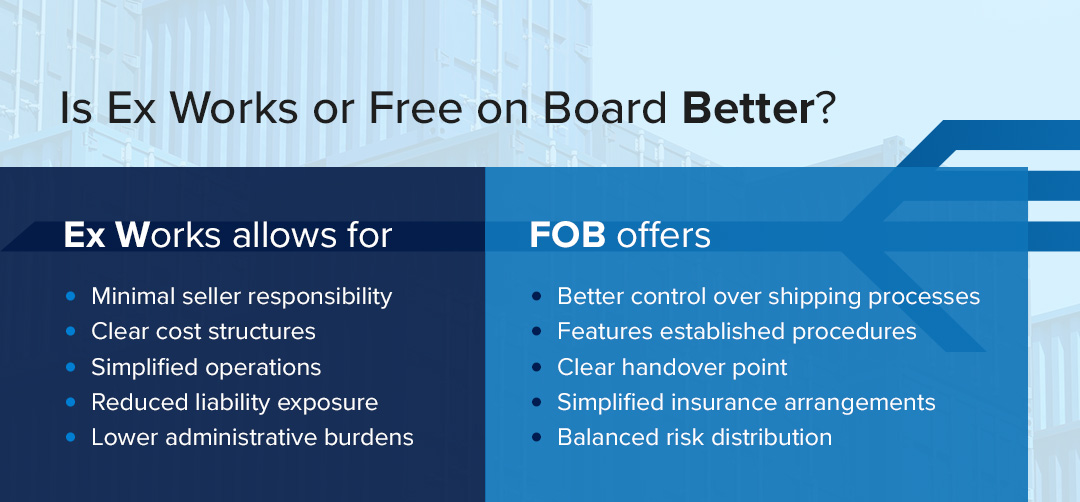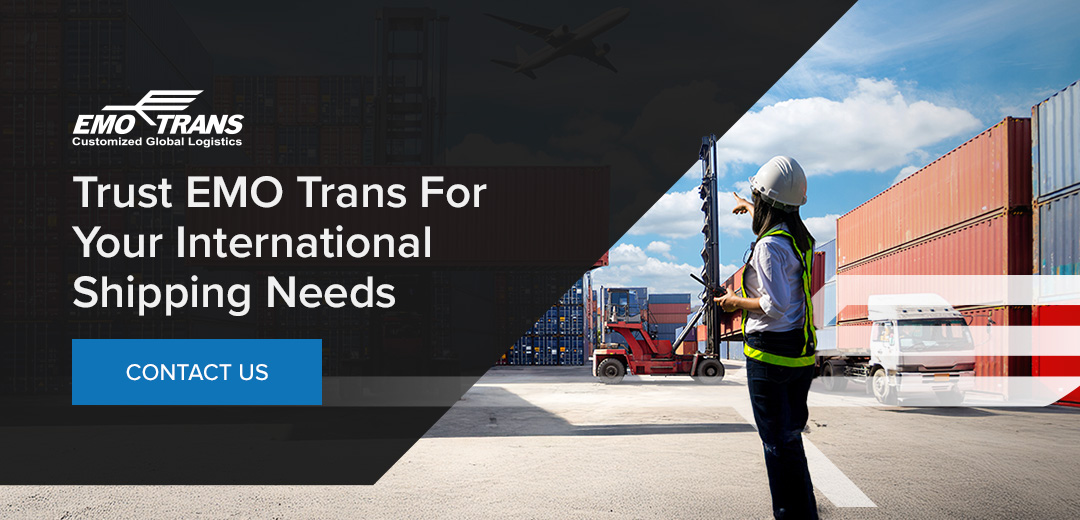
Understanding Incoterms® like Ex Works (EXW) and Free on Board (FOB) is crucial for businesses seeking logistics services. These foundational Incoterms® establish distinct frameworks for risk transfer, cost allocation and operational responsibilities between the parties.
Whether managing established supply chains or exploring new markets, logistics professionals must thoroughly compare Ex Works vs. Free on Board options to optimize their shipping strategies and maintain efficient global operations.
What Is Ex Works (EXW)?
EXW means the seller makes goods available for collection and provides essential documentation while the buyer assumes all subsequent risks and costs. Under this approach, the seller’s responsibility concludes at their premises or designated location, typically their warehouse or factory.
Ex Works represents the most basic arrangement in international trade terms.
The buyer’s scope encompasses every aspect of the shipping process, starting from the moment goods are made available. Consider a manufacturer in Detroit shipping auto parts to Mexico. Under EXW, the Mexican buyer must arrange everything from forklifts at the Detroit facility to customs clearance at both borders. The responsibilities include providing the following:
- Specialized loading equipment for the cargo
- Domestic transportation in the origin country
- Export customs clearance and documentation
- International freight arrangements
- Import duties and taxes
- Final delivery coordination
This arrangement demands robust logistics capabilities from the buyer, who must navigate complex international shipping requirements independently. Buyers must establish relationships with freight forwarders, customs brokers and transportation providers in the seller’s country. They must maintain comprehensive cargo insurance from the point of collection, as damage during loading at the seller’s premises falls under the buyer’s responsibility.
Buyers must also thoroughly understand local regulations in the seller’s country, maintain appropriate insurance coverage from the moment of collection and potentially establish a presence in the seller’s market to manage logistics effectively.
What Is Free on Board (FOB)?
FOB establishes a more balanced distribution of responsibilities between trading partners. This Incoterm applies exclusively to maritime and inland waterway transport, showcasing its specialized nature in international logistics. For example, when shipping electronics from Shanghai to Los Angeles, the Chinese supplier handles all logistics until the goods are loaded onto the vessel in Shanghai.
Under FOB arrangements, the seller maintains responsibility until the goods are loaded onto the vessel at the port of shipment. This responsibility includes managing:
- Inland transportation to the port.
- Export customs clearance and documentation.
- Port handling charges.
- Loading costs and associated risks.
- Proof delivery documentation.
The critical moment occurs when goods cross the ship’s rail, marking the transfer of risk and responsibility to the buyer. From this point, the buyer assumes all costs and risks associated with international transportation, import duties and final delivery.
Under FOB, sellers must provide extensive documentation, including a clean on-board bill of lading, commercial invoice, packing list, export declaration, certificate of origin when required and inspection certificates if applicable.
EXW and FOB Differences
When comparing Ex Works vs. FOB, several critical distinctions impact business operations and risk management strategies.
Risk Transfer Point
The most fundamental difference is when risk transfers from seller to buyer. Under Ex Works, risk transfer occurs when goods are made available at the seller’s premises, often before goods are loaded.
FOB extends seller liability through loading onto the vessel, providing significantly more protection for buyers. Damage during inland transport to the port under FOB remains the seller’s responsibility. Under EXW, such damage would be the buyer’s concern.
Cost Allocation and Financial Planning
Ex Works places virtually all costs with the buyer, from collection to delivery. Free on Board distributes costs more evenly, with sellers responsible for expenses up to vessel loading, while buyers are responsible after loading. This difference impacts pricing strategies and overall shipping costs, including working capital requirements, banking and better credit terms and cash flow management.
Export Documentation and Compliance
While Ex Works requires minimal seller documentation, FOB mandates comprehensive export documentation preparation. FOB sellers must maintain expertise in export regulations, documentation requirements, customs procedures and port authority requirements.
For example, a U.S. company exporting electronics to Japan under FOB would handle all export licenses and customs declaration, while under EXW, these responsibilities would fall to the Japanese buyer.
Transportation Management and Control
Buyers coordinate all transportation arrangements under Ex Works, providing complete control but requiring considerable expertise. FOB splits this responsibility between sellers and buyers, offering advantages in supply chain visibility and quality control opportunities.
For instance, for a shipment from Shanghai to Rotterdam, the Chinese seller would manage trucking to the port and vessel loading under FOB. For the same shipment, the European buyer would need to coordinate these activities remotely under EXW.
EXW and FOB Similarities
Despite their difference, several crucial commonalities exist between these shipping terms.
Quality Assurance Standards
Both terms maintain identical standards for product quality and packaging requirements. Sellers must ensure goods meet specifications and are adequately prepared for transport, regardless of the chosen Incoterm. Seller responsibility under EXW and FOB includes checking product quality standards, packaging specifications, material safety compliance and weight and dimension accuracy.
Contract Fundamentals
The fundamental elements of contract formation remain consistent across Ex Works and Free on Board. Each requires precise delivery point requirements, clear timing agreements and detailed product specifications. Payment terms, force majeure provisions and basic documentary requirements follow similar patterns under both arrangements.
Risk Management Frameworks
Both terms establish clear principles for risk management and liability transfer. While the specific point of transfer differs, Ex Works and FOB require clear documentation of condition and quantity at the transfer point. Insurance requirements, damage reporting procedures and claims processing follow similar principles under both terms.
Compliance Obligations
Regardless of the chosen term, both parties must comply with international trade regulations, sanctions requirements and restricted party screening obligations. Anti-corruption laws, export control regulations and environmental compliance requirements apply equally under EXW and Free on Board.
Is Ex Works or Free on Board Better?

When comparing EXW vs. FOB, you must consider organizational capabilities and specific business needs. Here’s how to know which option is best for your situation.
When to Choose EXW
Ex Works allows for minimal seller responsibility, clear cost structures, simplified operations, reduced liability exposure and lower administrative burdens. However, it provides limited control over shipping, potential customs challenges, reduced visibility, complex insurance requirements and higher buyer costs.
Ex Works may be beneficial if your company desires the following:
- Minimal involvement in shipping logistics
- Strong international shipping expertise
- Clear separation of responsibilities
- Greater experience in international trade
- Simplified pricing structures
- Easier navigation of local transportation infrastructure
When to Pick FOB
Free on Board offers better control over shipping processes and features established procedures, a clear handover point, simplified insurance arrangements and balanced risk distribution. However, it requires higher seller involvement, more complete documentation, greater administrative burden and an extended liability period.
You might want to opt for FOB if you:
- Want to maintain control through critical loading stages.
- Have established port relationships.
- Prefer balanced risk distribution.
- Prioritize supply chain visibility.
- Have experience with maritime shipping.
- Want standardized international shipping procedures.
Trust EMO Trans For Your International Shipping Needs
Choosing between Ex Works and Free on Board is a complex decision that requires expert guidance.
Since 1965, EMO Trans has provided customized global logistics solutions, helping businesses navigate these crucial shipping decisions. Our ISO-certified operations, comprehensive customs expertise and dedicated customer service ensure the implementation of optimal shipping strategies.
Contact us today for a tailored quote and leverage our global reach for seamless international trade operations.

